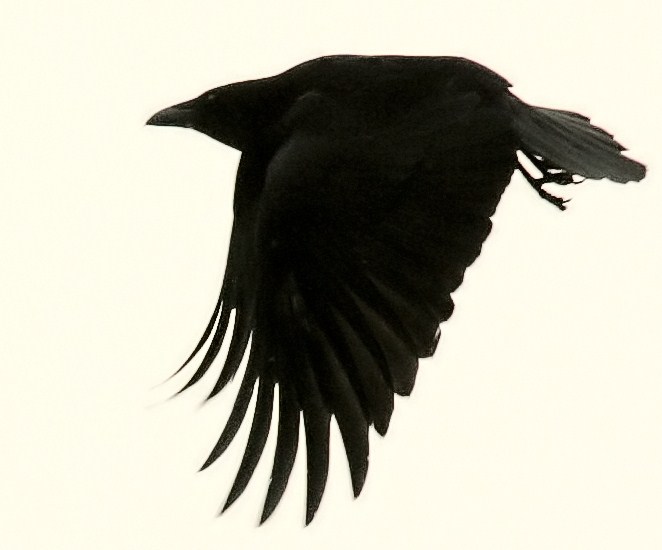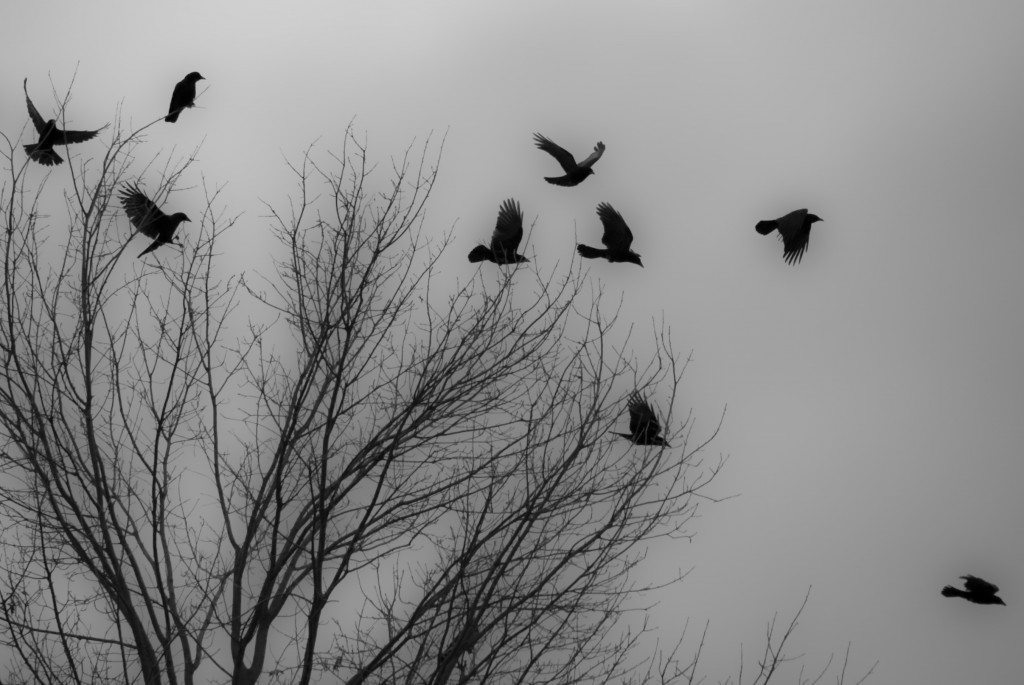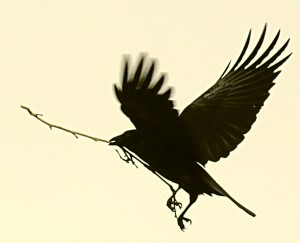This first ran March 9, 2011. I haven’t changed my mind. Crows take care of each other, talk constantly, have their enemies lists, are smart, are wicked, and remind me a lot of the rest of us. “Light thickens, and the crow makes wing to the rooky wood.” MacBeth is talking, telling his wife it’s a good night to murder the king. Even a century earlier, the collective noun was “a murder of crows.” Three centuries later, a poet watches a horse that’s been shot: “gorged crows rise ragged in the wind. The day/ After death I had gone for farewell, and the eyes/ Were already gone – that/ the beneficent work of crows.” A year ago I watched a crow kill and eat a nestling robin. Nobody likes crows. I think it’s because they’re so black – black feathers, black legs, black bills, black eyes. They look like flying shreds of a medieval hell.
“Light thickens, and the crow makes wing to the rooky wood.” MacBeth is talking, telling his wife it’s a good night to murder the king. Even a century earlier, the collective noun was “a murder of crows.” Three centuries later, a poet watches a horse that’s been shot: “gorged crows rise ragged in the wind. The day/ After death I had gone for farewell, and the eyes/ Were already gone – that/ the beneficent work of crows.” A year ago I watched a crow kill and eat a nestling robin. Nobody likes crows. I think it’s because they’re so black – black feathers, black legs, black bills, black eyes. They look like flying shreds of a medieval hell.
 Well, ok, it’s all true. Then my friend Nell did a radio story on how West Nile virus was so hard on crows because they live in families whose members were dying. So I looked up crows. NPR and PBS have minor fixations on them. Citizen science has projects on them. I have undergone crow revisionism and here’s my argument.
Well, ok, it’s all true. Then my friend Nell did a radio story on how West Nile virus was so hard on crows because they live in families whose members were dying. So I looked up crows. NPR and PBS have minor fixations on them. Citizen science has projects on them. I have undergone crow revisionism and here’s my argument.
Crows mate for life, have one brood a year, and the siblings help raise the crowlets. If a spouse dies, a nephew or niece helps out. During the spring mating season, the families live separately; but during fall and winter, the families all roost together. They begin congregating in the early evenings, pick a staging area, shift areas, and join other families, their numbers increasing logarithmically, hundreds and thousands of them, flying like a blizzard, and says a researcher, great confusion is evident. They somehow converge into a single roost, talking continually on into the night. The noise they make is three-dimensional.
Nobody knows why they do this: maybe they’re warmer this way, maybe it’s defense against predators like hawks and owls, maybe they can gang up on the hawks and owls, maybe they tell each other where the food is.
 For some reason, crows’ social sense extends to us. They recognize individual people. If you feed them, they wait for you and for no other person; they follow you down the street; they follow your car; they follow your car if you’re across town; they tell their friends about you and pretty soon, you’re followed by a gang of crows. If you take young crows out of nests to band them, the crows hate you. “Whenever they notice me in their territory,” says a crow researcher who bands young crows, “they will come over and yell at me. They will follow me around and keep yelling for as long as I am there.”
For some reason, crows’ social sense extends to us. They recognize individual people. If you feed them, they wait for you and for no other person; they follow you down the street; they follow your car; they follow your car if you’re across town; they tell their friends about you and pretty soon, you’re followed by a gang of crows. If you take young crows out of nests to band them, the crows hate you. “Whenever they notice me in their territory,” says a crow researcher who bands young crows, “they will come over and yell at me. They will follow me around and keep yelling for as long as I am there.”
So to cap my argument, another poem, this one about farmers shooting crows: “they ran out of shells before they ran out of crows/ and the crows came back and walked around the pellets and/stuck out their tongues/ and mourned their dead and elected new leaders/ and then all at once flew home to fuck to fill the gap.”
Credits:
first poem – Robert Penn Warren, “Dead Horse in Field;” second poem – Charles Bukowski, “the weather is hot on the back of my watch”
first & fourth photos – Dr. Pat; second photo – Will Montague; third photo – Daniel Ripoll